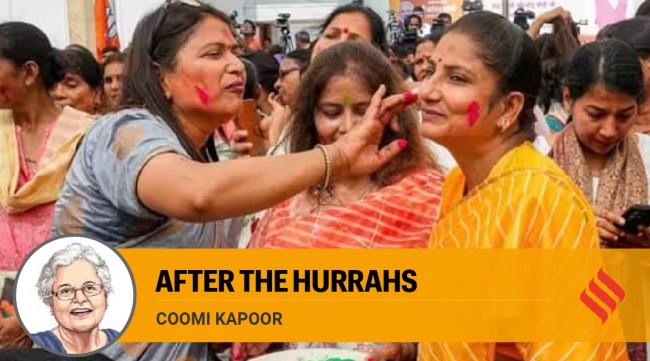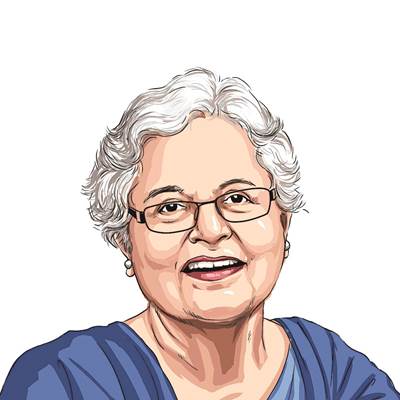Opinion Coomi Kapoor writes: Euphoria over women’s reservation Bill should be tempered with scepticism
The double standards of political parties who claim to have been fighting for women’s empowerment for years is exposed by their failure to voluntarily allot tickets for elections to women
 The Modi government’s introduction of the Bill in a five-day special session at the fag end of a 10 year-term, taking everyone by surprise, was no doubt a political coup. (Express File Photo)
The Modi government’s introduction of the Bill in a five-day special session at the fag end of a 10 year-term, taking everyone by surprise, was no doubt a political coup. (Express File Photo) Admittedly, I sound like a party pooper, but the hurrahs and hype over the passing of the women’s reservation Bill should be viewed with a pinch of scepticism. In the race to score brownie points with women voters, few dared to dwell on the cynical manner in which a bill of such far-reaching dimensions was hustled through.
The Modi government’s introduction of the Bill in a five-day special session at the fag end of a 10 year-term, taking everyone by surprise, was no doubt a political coup. The Bill was shrouded in such secrecy that it was not listed in the session’s business agenda or even mentioned at an all-party MPs’ meet. It was kept under wraps until Prime Minister Narendra Modi made his dramatic announcement on the second day of the special Parliament session. Within two days flat, the Bill was passed with almost total unanimity in the Lok Sabha and the Rajya Sabha.
The government deserved congratulations for clearing a bill which for 27 years was on hold because of the silent and not-so-silent resistance by male MPs, who feared that the ground would be cut from under their feet. This time, the Opposition, particularly the Congress, was more concerned with trying to claim credit for being the first to suggest the proposed reform, rather than questioning the unseemly haste and complete lack of consultation. In the game of optics, questioning any aspect of the women’s reservation Bill was like criticising mother’s milk or the tricolour. With time not on their side, the Opposition did not, as should normally have been the case, even insist on referring the Bill to a special parliamentary committee where MPs could study the clauses and suggest improvements to a piece of legislation which will have a major impact on the electoral character of our democracy.
Home Minister Amit Shah acknowledged that the hastily drawn up legislation might have flaws, but remarked breezily that any shortcomings in the Bill would be “rectified along the way”. The government, while basking in the glory of taking this historic step, has left the task of fine-tuning the Bill and translating it into a reality to future governments — a post-dated cheque with the actual time for encashment left uncertain.
It was politically savvy to peg the actual implementation of the Women’s Reservation Bill to the process of delimitation of constituencies. Delimitation is a mine field which is bound to evoke an outcry in southern states and explains why, for the last 50 years, all governments have avoided wading into this bog. Redrawing and increasing Lok Sabha constituencies on the basis of population will mean that south India gets short changed as the proportion of seats in the BJP-ruled cow belt states in Parliament automatically rises.
The southern states have long maintained that they cannot be penalised for practising family planning. If the implementation of the women’s reservation Bill gets delayed further than 2029, it will likely be blamed on the complexities of delimitation. Indian women have come a long way from when Ram Manohar Lohia described them as “bachche banana ki machine’’.
But strangely, in contrast to the impressive number of Indian women in higher education and specialised fields once reserved for men, the percentage of women in Lok Sabha has never crossed 15 per cent. This is far below the global average of 25.5 percent. In our highly patriarchal rough-and-tumble political milieu, it is difficult for an aspiring woman politician to break through without the help of male mentors.
In recent years, among the few women MPs to rise up the political ladder entirely on their own steam are the late Sushma Swaraj and Mamata Banerjee. Most of our prominent women politicians were and are dynasts. The late Sharad Yadav argued that his staunch opposition to the Bill was that “parkati mahilayen (women with short hair)” would dominate the quota. His fear was misplaced. Today’s ruling party tends to select its candidates on regional considerations, caste and religion, not elitism or education. A greater danger than upper-caste and upper-class women dominating is that many women candidates could be ciphers, selected for their pliability and family links to powerful male politicians.
The double standards of political parties who claim to have been fighting for women’s empowerment for years is exposed by their failure to voluntarily allot tickets for elections to women (Though the BJP must be credited for amending its party constitution to ensure 33 per cent reservation for women within its organisational framework). Two politicians who stand out in genuinely attempting to empower women are Navin Patnaik and Mamata Banerjee. In 2019, Patnaiks’s BJD allocated a third of Odisha’s 21 Lok Sabha seats to women, Banerjee fielded 17 women in West Bengal for 42 Lok Sabha seats. Probably the road ahead for empowering women would be quicker and smoother if all parties agreed to adopt this doable first step in opening doors for women.
Coomi Kapoor is consulting editor, The Indian Express






